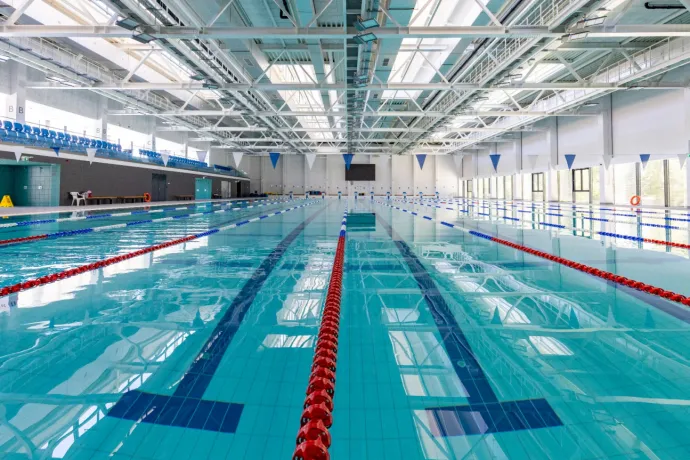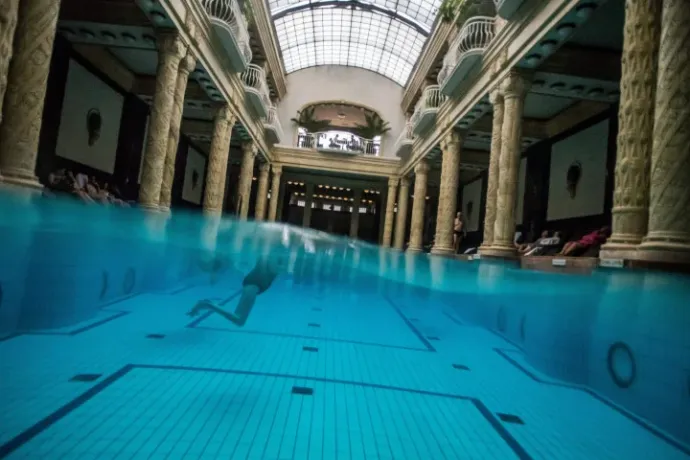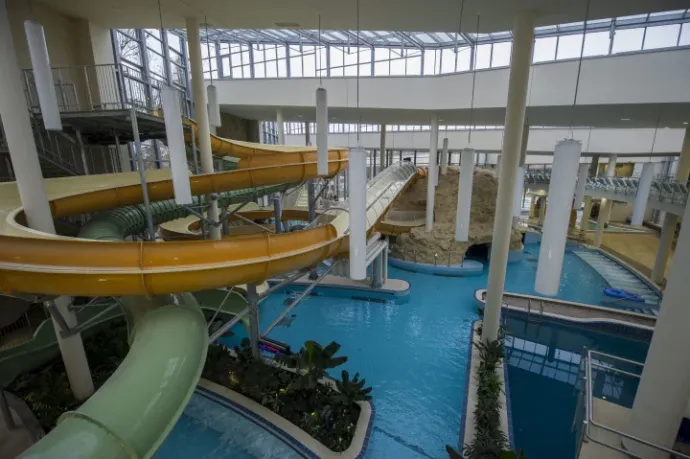Up to half of Hungary's public baths may close for the winter due to the high energy prices

The extreme increase in electricity – and gas prices presents a serious problem for both the Hungarian economy and the population as a whole. If the cost of energy increases practically tenfold from one year to the next, what can the institutions that are key players in both sport and tourism do about it? How will it be possible to adequately heat the baths, the swimming pools, the covered tennis courts and the ice rinks in the upcoming season?
On 29 August 2022, the domestic electricity market saw something that has never been seen before. Electricity could only be bought at a four-digit price in euros, i.e. above €1,000/MWh, for 2023. We’ve discussed rising prices before, usually when the price crossed another nightmarish threshold.
The price increases have typically been examined each time there was a €100 jump. But then, the price increase accelerated so much that we skipped one of these 100 euro steps almost without noticing.
The public, the economy, and hobbies
Under these circumstances, the foundation of the business model of sectors that rely predominantly on energy (brick factories, laundromats, bakeries, even water distribution services) will collapse, just as heating buildings with a lower energy efficiency will be difficult for the public.
However, the recent significant increase in energy prices will not only affect these sectors, but tourism and sports as well, as the fate of public baths, swimming pools, covered tennis courts and ice skating rinks becomes the next question to consider.
Zoltán Kántás, Chairman of the Association of Hungarian Baths said that they assessed their members’ situation in August, and it seems that already in 2022, the energy costs of baths will be 40 percent of their operation cost instead of the 8-15 percent it used to be, and as a result
a third, but maybe even half of the baths may be forced to close down.
The price increase will mean a total additional expenditure of 350-500 million forints. On top of that, the crumbling of the baths will most likely have an effect on the entire tourism sector.
Post-pandemic
The timing is particularly unpleasant as the baths were just beginning to get back on their feet following the two-year pandemic, but these energy prices have pushed some of them to the brink of bankruptcy.
On top of it all, the baths and swimming pools are often owned by the local municipality. While those in the business understand the priorities and are fully aware that municipalities must first and foremost meet their legal obligations for providing supplies, the dilemmas are not simple:
should we support the baths, or should we let go of them, even though this also means letting go of tourism as a whole, which generates significant income?
It’s a tough choice to be forced to make, especially because other costs of baths, such as labour and raw material costs will also be growing, and due to the increased utility costs, the tax-law changes, inflation and the increased gas prices, people will most likely have less money to spend in the fourth quarter. Due to this, even if the prices remained the same, public demand may decrease by 20-30, or even up to 40-50 percent.
Obviously, the extreme energy price increase cannot be handled simply by raising ticket prices, but if the baths were to attempt this, it would result in a further drop in demand.
The short-term task is survival, while the mid-term one is decreasing dependency on gas – Zoltán Kántás says, adding that in this season of forced downtime energy efficiency tenders would be very important, and reviving them would be a good idea.
In any case, the association started lobbying the government, and there are also ongoing talks with the Hungarian Tourism Agency. Their goal is to ensure that the baths which are significant for the national economy receive energy sources at the same price as the public.

Tennis courts
Henrik Horváth, leader of the “Future Tennis Team” club and foundation in Fót, told us that it will be primarily those playing the sport competitively who will experience the courts’ difficult situation in the upcoming season.
Both setting up and heating the tents is a big cost. When energy prices were lower, tents (bubbles) were popular, but they need a lot of heat because of the overpressure, as they are not very well insulated, and air and energy can easily escape from the tent.
According to one example we were given,
until 30 September 2022, the operator of a tennis court will be charged 124 forints for a cubic metre of industrial gas, but his new contract is for 1450 forints for the same amount.
Asking the customers to pay ten times what they have been is not an option. Although there may be one-or two customers at each venue who are able to pay 15-20 thousand forints per hour for using the tennis court, most operators will not even try to introduce such prices: in other words, they will not open.
At this point we have no information about sports associations having a solution for the situation. Andrea Oláh, press secretary for the Hungarian Ice Skating Association (MOKSZ) for example wrote that the increasing prices are a burden for both the Association and the individual clubs, as they are all renters at the ice rinks.
The difficulties faced by competitive sports
Although these tennis schools are small, they do not qualify for any reductions, because their high gas consumption excludes them from the category of micro-enterprises.
We asked if there was any way to tackle this by partial opening hours, but as we were told – for example, at the previously mentioned club in Fót – the cost of installing the three heated tents is 900,000 forints. This is done by a contractor who works on this with a team of 15 people, but the cost of dismantling them is similar. If the tent is then open from September to April, the cost of this can be recovered, but repeatedly installing and dismantling a tent is not realistic.
In Henrik Horváth’s opinion this is not even the biggest problem, as those who play tennis as a hobby will play in summer, and will simply switch to a different sport during the winter. But if the opportunities to compete are reduced to a third of what they used to be or halved, it will not be easy for those playing competitively.
Hungary does not have a particularly strong system for raising up the next generation of players as it is. While there always are talented children, the pool to choose from is smaller than in neighbouring countries. Moreover, at these prices it will not only be difficult to train, but also to organise competitions. The clubs don't want to go out of business either, so those who do set up tents will prefer renting them out.
Different odds
Tibor Sánta, head of Termalfurdo.hu told Telex that the seasonally open baths are responding to the situation in various ways, with some having decided to end the season earlier than usual. Ticket prices tend to change towards the end of the beach season, especially in September, and tend to go down normally, as spas offer fewer services during the low season and not everything is open.
Some spas announce their prices for the year ahead at the beginning of the year or at the beginning of the beach season. At this point, many are still waiting, either because no decision has been made or because it is not yet public. In addition, as the vast majority of spas are owned by municipalities, in many cases the decision is preceded by a bureaucratic process. This decision, however, must take into account other considerations besides the rigid economic ones, such as the interest of the tourist industry.
If the bath of a major spa town closes, then there is no point for the hotels built around it to stay open either.
In a more fortunate situation, the thermal water is also used to provide hot water, so there is no need to buy expensive gas, and if there is enough hot water, it may be fed into the heaters before it enters the pool, so there is no need to spend money on heating either (as in Cserkeszőlő), and it may even be used to generate electricity.
However, partial opening wouldn't solve the problem here either, as the complete shutdown and restart of the pools is a process that takes several weeks. This is because if the pools are not in continuous operation, a permit is required for restarting them, which would have to be preceded by the repeated sampling of the water.
Unfortunately, most of the buildings housing these baths are energetically outdated, and the municipalities are not even able to budget for renovations. Also, since they are owned by municipalities, and are not small or medium-sized enterprises, they are not able to apply for any tenders.
It was fun while it lasted
Unfortunately, institutions are already announcing that some parts of their buildings will not be winterised at all. Ditta Magyar-Mátyus of Szeged's Napfényfürdő Aquapolis explained to Szeged365 that some of the teaching – and swimming pools will not be winterised at all. The main reason for this – apart from the energy costs – is the condition of the tent, which does not allow for its rebuilding and usage in the winter season this year. The manager of the spa also said that they had recently made efforts to reduce their energy consumption.
The increasing energy prices will also affect the Várfürdő in Gyula. Director Miklós Kun told Spabook that they used to buy gas for 60 forints, which was manageable, but the current market price is more than 1000 forints per cubic metre.
“This means that if we were to keep our racing pool operational, its heating alone would cost 2-3 million forints per day.”
The racing pool will thus be closed for the winter season, given that the 280-300 thousand cubic metres of gas used up by the company annually are almost exclusively used to heat this pool. And with the new prices, this is something the bath can’t afford. Spabook also reported that Martfű Thermal Spa has also announced a reduction in their services due to the increased utility costs.

What about the future?
At today's gas and electricity prices, the economy would collapse quite quickly, which is certainly not in the interest of the energy industry. Energy expert József Balogh warns, however, that these insane prices will unfortunately be reflected in the next quarter's residential rates, because however much the "market" portion of residential bills has increased, it is only a fraction of the new market price.
Unfortunately, the European market mechanisms were not prepared for a huge supplier (Gazprom) holding back the usual amount, and now all solar, wind, coal, and nuclear power plants are setting their prices as if they were a newly established gas-fired power plant that is now purchasing gas.
The current prices are probably an indication that the logic of war is at work now, and that Russia has let go of supplying the Western European region on a permanent basis. Unfortunately, as crazy as the market is now, the Russian position is not surprising, as the EU had already indicated before the war that it would do its utmost to get off Russian fossil energy as soon as possible.
And now that – regardless of how justified it is morally and from a solidarity point of view – the EU started a war of sanctions, it comes as no surprise that the Russians are deploying their full arsenal (i.e. unpredictability and a reduction of deliveries). Russia has most definitely lost the West, and at this point, its thinking resembles that of the lángos-merchant from Balaton: this customer is never coming back, so now is the time to make as much money off of them as possible.
If you enjoyed this analysis, and want to make sure you don't miss similar content in the future, subscribe to the Telex English newsletter!
The translation of this article was made possible by our cooperation with the Heinrich Böll Foundation.